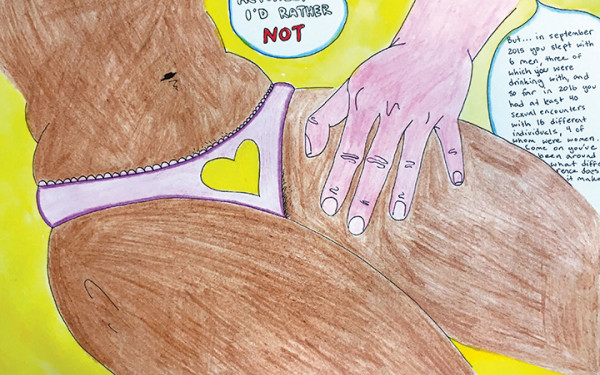Cats Against Catcalling
How Women Are Fighting the War on Rape Culture, One Reblog At a Time
The concept of rape culture has seen renewed awareness in the last few years, and we owe it all to websites like Tumblr, Instagram and Facebook, according to Dr. Carrie Rentschler, a McGill associate professor and William Dawson Scholar of Feminist Media Studies.
Rape culture is defined as the normalization of sexual violence due to societal attitudes about gender and sexuality. It’s essentially victim-blaming, and the justification of male sexual violence and is deeply rooted in virtually every society around the world. It is totally ubiquitous—it reaches both women and men, regardless of their sexual orientation or ethnicity. It can be found in many forms: whether you’re committing any kind of a sexual assault, “slut-shaming” a woman, wearing a t-shirt that says “Keep Calm and Rape A Lot” or not intervening when you witness gender-based violence, you’re perpetuating a deeply-skewed point-of-view that the survivors, who are usually women, should be held responsible for what happens to them.
“It’s going to friends for help, and they ask you what you were wearing. It’s going to the authorities, and they ask you how much alcohol you drank,” Rentschler said. “It’s a response to demystify sexual assault.”
In other words, it’s still too difficult for the world to understand that a woman might be a survivor of sexual violence for no reason other than the fact that the perpetrator decided so. For many, it’s still too hard to fathom that maybe, regardless of how she looked or what she said, she didn’t deserve it.
While addressing the crowd at a speakers event on gender-based violence last Wednesday, organized by McGill Students’ Friends of Doctors Without Borders and McGill Students for Partners in Health, Dr. Rentschler—who’s also the director of McGill’s Institute for Gender, Sexuality and Feminist Studies—emphasized the important role of the internet in today’s feminist movement.
In a 2014 article entitled “Rape Culture and the Feminist Politics of Social Media,” she suggested “that online sites can serve as a key source of feminist education,” and that the bloggers that made up the movement “utilize social media in order to respond to rape culture, and hold accountable those responsible for its practices when mainstream news media, police and school authorities do not.”
in other words, since our schools, the police and even the public have failed us time and time again, we’ve been forced to create a new support group online that reaches way beyond any borders or social demographic. Even the media, who arguably have the responsibility of correcting society’s wrongs, have failed us—not only does mainstream media frequently make excuses for the perpetrators and blame the survivors of high profile sexual abuse cases, but they dangerously replicate rape culture by refusing time and time again to show the side of the story in which the survivor is unequivocally right.
According to the Quebec’s Department of Justice, “sexual aggression against women is widespread in Canadian society,” despite the fact that ours is one of the most egalitarian societies in the world. Women account for over 85 per cent of sexual assault victims, and disadvantaged groups are particularly at risk: women with disabilities, Aboriginal women, single, separated or divorced women and women who are unemployed or in poverty are at heightened risk of being assaulted. Furthermore, only 15 per cent of victims will report a sexual assault. Why? Because people simply don’t believe them.
Even in the case of Bill Cosby, in which 59 women have come forward to say he sexually assaulted or raped them, the media has met the survivors with suspicion, often accusing them of being after settlement money or bringing up their “dicey” pasts of partying and drug abuse—one article on conservative news site The Daily Caller was titled “Histories of Several Cosby Accusers Cast Doubt On Tales.”
Looking for a place of non-judgment, or for someone who will believe your story, is often the hardest part of surviving a sexual assault. Survivors often keep their experiences to themselves, because of the shame they feel and the belief that they could have done something to prevent it, that it was somehow their fault, or that worse, nobody would believe them.
That’s why the internet, known for its anonymity, is a great place for victims to come together, share their stories and find support. By replacing their real names with a username, survivors have found a way to speak out against sexual assault and gender-based violence with confidence—giving other women the strength and knowledge to call out rape culture when they see it in their everyday lives.
In creating illustrations of cats that carry the message “Cats Against Catcalling” and sharing them across Tumblr or in sharing their survival stories, women are engaging in a worldwide conversation about rape culture from a place of true understanding. After all, who better to lead the fight against rape culture than the women who experience it every day, in its mildest to harshest forms?
For your sanity, here are some of my favourite feminist Tumblr blogs for you to search up: Notorious R.B.G, Femsplain, Facts About Feminism and of course, the brilliant Feminist Lisa Frank.

2_900_580_90.jpg)





WEB_600_375_90_s_c1.jpg)